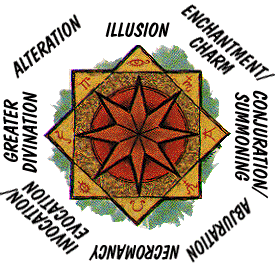Specialist
Wizard Spell List
Weapons
They are limited to those that are easy to learn or are sometimes useful in their own research. Hence, a wizard can use a dagger or a staff, items that are traditionally useful in magical studies. Other weapons allowed are darts, knives, and slings (weapons that require little skill, little strength, or both).
Armor
Wizards cannot wear any armor.
Followers & Strongholds
Unlike many other characters, wizards gain no special benefits from building a fortress or stronghold.
They can own property and receive the normal benefits, such as monthly income and mercenaries for protection. However, the reputations of wizards tend to discourage people from flocking to their doors. At best, a wizard may acquire a few henchmen and apprentices to help in his work.
Features
A Specialist must choose a School of Magic (Groups) and follow the character creation rules therein.
Wizards can use more magical items than any other characters. These include potions, rings, wands, rods, scrolls, and most miscellaneous magical items. A wizard can use a magical version of any weapon allowed to his class but cannot use magical armor, because no armor is allowed. Between their spells and magical items, however, wizards wield great power.
Specialist wizards must be single-classed.
Dual-class humans can choose to become specialists.
Lesser Divination is not available as a specialty. The spells of this group, vital to the functioning of a wizard, are available to all wizards.
A specialist gains one additional spell per spell level, provided the additional spell is from their school. Thus, a 1st-level illusionist could have two spells--one being any spell he knows and the other limited to spells of the illusion school.
Specialists receive a +1 bonus when making saving throws against spells from their school when cast by other wizards.
Other characters suffer a -1 penalty when making saving throws against a specialist casting spells within his school. Both of these modifiers can be in effect at the same time--for example, when an enchanter casts an enchantment spell at another enchanter, the modifiers cancel each other out.
Specialists receive a bonus of +15% when learning spells from their school and a penalty of -15% when learning spells from other schools. The bonus or penalty is applied to the percentile dice roll the player must make when the character tries to learn a new spell.
Whenever a specialist reaches a new spell level, he automatically gains one spell of his school to add to his spell books. This spell can be selected by the DM or he can allow the player to pick. No roll for learning the spell need be made. It is assumed that the character has discovered this new spell during the course of his research and study.
When a specialist attempts to create a new spell, the DM should count the new spell as one level less (for determining the difficulty) if the spell falls within their school of study.
Magic Item Creation
All wizards (whether mages or specialists) can create new magical items, ranging from simple scrolls and potions to powerful staves and magical swords.
Once he reaches 9th level (and given the right formula), a wizard can pen magical scrolls and brew potions.
Scrolls require the right quill (hand picked, +5%), paper (paper +5%, parchment 0%, papyrus -5%) and specialized ink (i.e. basilisk blood, etc.).
Protection scrolls require 6 days to write, undisturbed. A roll (by DM, secret) for success is made at the end (base 80%, -1% per spell level, + 1% per level of caster. Failed attempts could end up as cursed scrolls.
Potions require ‘special materials’ as well as 200 – 1,000 gp (based on power) of mundane materials and a functioning laboratory (valued at 2,000 gp or more, +10% per month for upkeep).
The days required to brew are the cost divided by 100. A (DM, secret) roll is made at the end (70%, -1% per 100 gp., per 2 levels of caster + 1%).
A failed result may be poisoned or cursed.
He can construct more powerful magical items only after he has learned the appropriate spells (or works with someone who knows them).
Some base costs:
- Appropriate vessel (sword, etc.) 1,000 – 10,000
- Preparation 2 weeks – month, + 500 gp
- Enchanting: cast Enchant an Item, needed spells, ‘special’ (DM) conditions, permanency
- Successful (DM, secret) roll for success, 60% (+1% per caster level, -1% per special material).
- Failure, and the item could be cursed.
Learning Spells
Learning and casting spells require long study, patience, and research. Once his adventuring life begins, a wizard is largely responsible for his own education; he no longer has a teacher looking over his shoulder and telling him which spell to learn next. This freedom is not without its price, however. It means that the wizard must find his own source for magical knowledge: libraries, guilds, or captured books and scrolls.
Whenever a wizard discovers instructions for a spell he doesn't know, he can try to read and understand the instructions.
The player must roll percentile dice. If the result is equal to or less than the percentage chance to learn a new spell, the character understands the spell and how to cast it.
He can enter the spell in his spell book (unless he has already learned the maximum number of spells allowed for that level).
If this die roll is higher than the character's chance to learn the spell, he doesn't understand the spell.
Once a spell is learned, it cannot be unlearned. It remains part of that character's repertoire forever. Thus, a character cannot choose to "forget" a spell so as to replace it with another.
Spell Books
A wizard's spell book can be a single book, a set of books, a bundle of scrolls, or other unique recording methods.
The spell book is the wizard's diary, laboratory journal, and encyclopedia, containing a record of everything he knows. Naturally, it is his most treasured possession; without it he is almost helpless.
A Specialist’s spellbook cannot be read using a typical Read Magic. Instead it must be read by a specialized Read Magic (i.e. Read Illusionist Magic) known by members of that school.
Bard spellbooks cannot be read by mages (they are a mixture of music and spell notation).
Starting spellbooks have 3d4-2 1st level spells and 1d3 2nd level spells in them. Roll on the appropriate table to generate the actual spells. Read Magic and Detect Magic are automatic.
Spellbooks cost 50 gp. Per page (travelling book cost 100gp per page). Books can have no more than 100 pages, scrolls no more than 25 pages, travelling books no more than 50.
Each spell requires a number of pages equal to its level + d6-1 additional pages.
Casting Spells
A spell book contains the complicated instructions for casting the spell -- the spell's recipe, so to speak. Merely reading these instructions aloud or trying to mimic the instructions does not enable one to cast the spell. Spells gather and shape mystical energies; the procedures involved are very demanding, bizarre, and intricate. Before a wizard can actually cast a spell, he must memorize its arcane formula. This locks an energy pattern for that particular spell into his mind. Once he has the spell memorized, it remains in his memory until he replaces it. Because of the demands casting imposes on the physical body, the Wizard can cast only a certain number of times per day (indicated on the Spell Progression Chart). The caster can cast more than this allotment in a day, but he risks severe penalties.
A wizard gains a bonus number of memorizable spells per day equivalent to priests (see the Wisdom chart, but use the mage’s intelligence score).
Spell Research and Acquisition
Another important power of the wizard is his ability to research new spells and construct magical items. Both endeavors are difficult, time-consuming, costly, occasionally even perilous. Through research, a wizard can create an entirely new spell, subject to the DM's approval.
When a wizard gains a new spell level he automatically receives 1 spell of that level ‘for free’ (it must be common, you must roll on your ‘Chance to Know,’ and it must be from the correct school).
Mages can copy spells from another source. This requires 24 uninterrupted hours, permission (usually 50 gp x level of spell), and a successful Spellcraft roll (additionally, the character must have the NWP Reading/Writing but does not need to roll it)
Spells can be memorized from a ‘foreign’ spell book/scroll if Read Magic is cast and a ‘Chance to Know’ roll is successful.
Researching a new spell requires 2 weeks per spell level of the spell being researched.
The mage must be in good health the entire time.
A ‘Chance to Know Spell’ is rolled at the end.
No adventuring can happen during this time.
If failed, another week of study is required… this continues until the character succeeds or gives up.
The cost is d10 x 100 gp. per spell level of the spell being researched.
He must also have access to a complete library (book value of over 10,000 gp)
Initial Funds
d4+1x10Hit Die Type
d4Ability Requirements
See School of MagicRaces Allowed
Any
Alignment Restrictions
None
Hero Points
General Hero PointsWizard Hero Points



